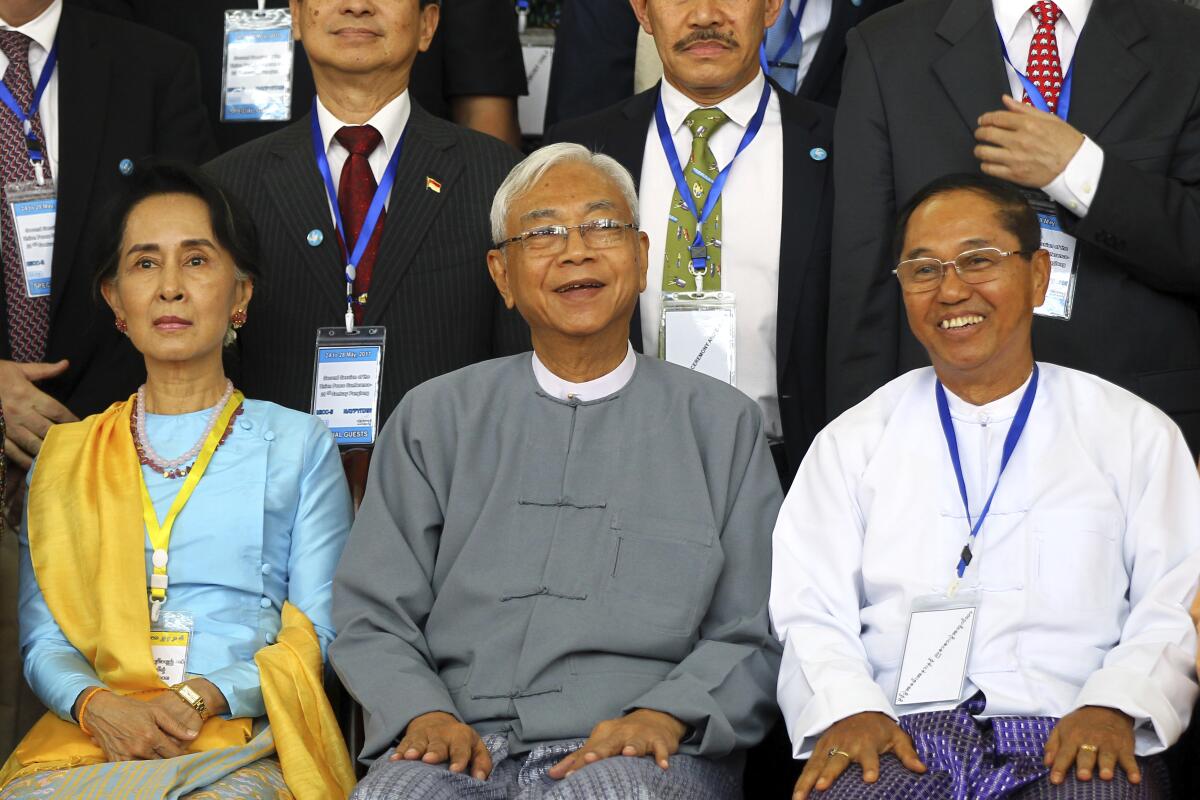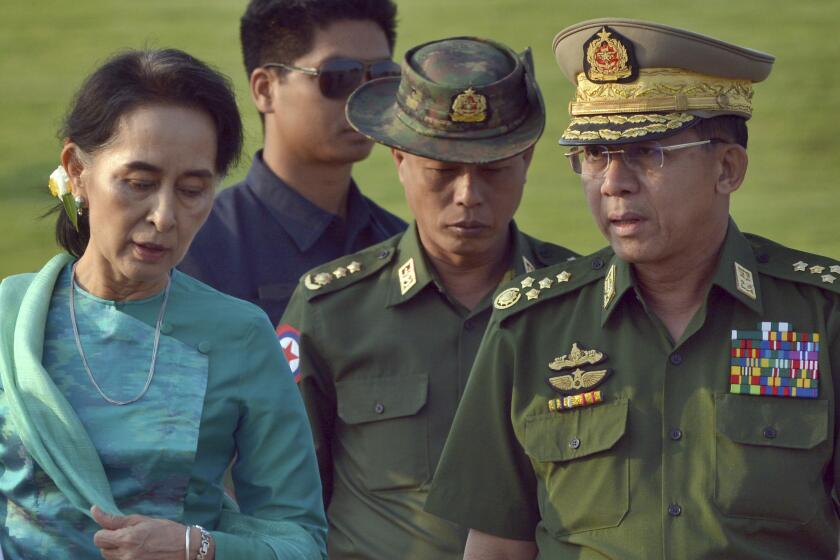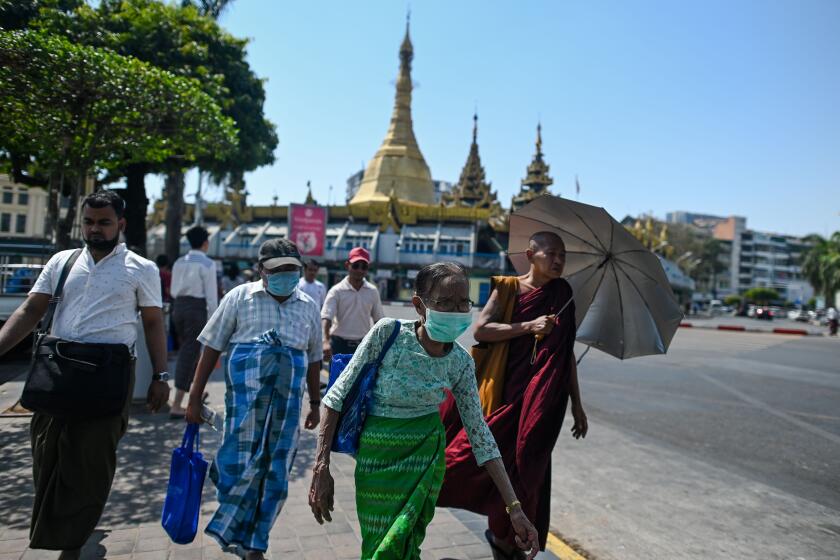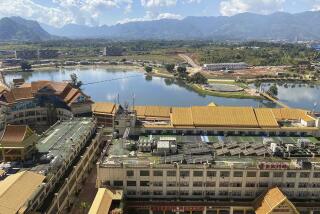Why is the military taking control in the Myanmar coup?

- Share via
JAKARTA, Indonesia — Myanmar’s military has staged a coup, detained leader Aung San Suu Kyi and other senior politicians and taken control of the country under a one-year state of emergency. Here are some possible reasons why the military has taken over now:
The constitution
The takeover announcement on military-owned Myawaddy TV cited Article 417 of the country’s constitution, which allows such a move in times of emergency. The announcer said the coronavirus crisis was a reason for the emergency.
For the record:
6:20 a.m. Feb. 2, 2021A previous version of this article said the military’s takeover in Myanmar was due in part to the government’s decision to hold elections in November despite the COVID-19 pandemic, according to the official announcement. That was not part of the announcement.
The military drafted the constitution in 2008 and retains power under the charter at the expense of civilian democratic rule. Human Rights Watch has described the clause as a “coup mechanism in waiting.”
The constitution also reserves key Cabinet ministries and 25% of the seats in parliament for the military, which prevents amendment of the charter without military support.
Some experts expressed puzzlement as to why the military would upset a status quo in which it already wields such power, but others noted the looming retirement of senior Gen. Min Aung Hlaing, who has been commander of the armed forces since 2011.
“There’s internal military politics around that, which is very opaque,” said Kim Jolliffe, a researcher on Myanmar civilian and military relations. “This might be reflecting those dynamics and might be somewhat of a coup internally and his way of maintaining power within the military.”
Myanmar’s civilian leader made a Faustian bargain with the army for political gain, critics say. It ended with her detention in Monday’s coup.
The military has assigned Vice President Myint Swe as head of the government for one year. He is a former military officer best known by the international community for cracking down on the 2007 monk-led popular protests known overseas as the Saffron Revolution.
Immediately after he was named president, Myint Swe handed power to the country’s top military commander, Gen. Min Aung Hlaing.
The elections
In November elections, Suu Kyi’s party captured 396 out of 476 seats in the combined lower and upper houses of parliament. The state Union Election Commission has confirmed that result.
But the military quickly claimed that there were millions of irregularities in voter lists in 314 townships that could have let voters cast multiple ballots or commit other “voting malpractice.”
“But they haven’t really shown any proof of that,” Jolliffe said.
Five years after emerging from military rule, optimism over Myanmar’s future is sinking over a troubled economy, a tarnished international image and an election that observers say won’t be free or fair.
The election commission rejected the claims last week, stating there was no evidence to support them.
The military takeover came on what was to be the first day of the new parliament following the elections. A later announcement on Myawaddy TV said the military would hold an election after the one-year emergency ends and would turn over power to the winner.
What’s happening now
Telecommunications in Myanmar came to a near halt in the morning and early afternoon. In the capital, internet and phone access appeared to be blocked. Many people elsewhere in the country who could still access the internet found their social media accounts had been temporarily suspended.
Barbed-wire roadblocks were set up across Yangon, the largest city, and military units began to appear outside government buildings such as City Hall.
Residents flocked to ATMs and food vendors, while some shops and homes removed the symbols of Suu Kyi’s party, the National League for Democracy.
What happens next
Governments and international organizations condemned the takeover, saying it sets back the limited democratic reforms Myanmar has made.
“This is an extremely crushing blow to efforts to present Myanmar as a democracy,” said Linda Lakhdhir, a legal advisor at Human Rights Watch. The country’s credibility “on the world stage has taken a massive hit.”
News Alerts
Get breaking news, investigations, analysis and more signature journalism from the Los Angeles Times in your inbox.
You may occasionally receive promotional content from the Los Angeles Times.
Watchdogs fear a further crackdown on human rights defenders, journalists and others critical of the military. Even before the current military takeover, journalists, free-speech advocates and critics of the military often faced legal action for publicly criticizing it.
In the U.S., Sen. Robert Menendez (D-N.J.), the incoming chairman of the Senate Foreign Relations Committee, raised the possibility that the United States could again impose economic sanctions, which were lifted by President Obama in 2016 when Myanmar was transitioning to civilian rule.
Former U.S. diplomat Bill Richardson, who quit a panel on the issue of Myanmar’s Rohingya Muslims after calling it a “whitewash,” said the Biden administration and other governments should act swiftly to impose sanctions. He questioned Suu Kyi’s ability to lead given her defense of the military’s actions against Rohingya.
“Because of Suu Kyi’s failure to promote democratic values as Myanmar’s de facto leader, she should step aside and let other Myanmar democratic leaders take the reins with international backing and support,” Richardson said in a statement.
More to Read
Sign up for Essential California
The most important California stories and recommendations in your inbox every morning.
You may occasionally receive promotional content from the Los Angeles Times.












